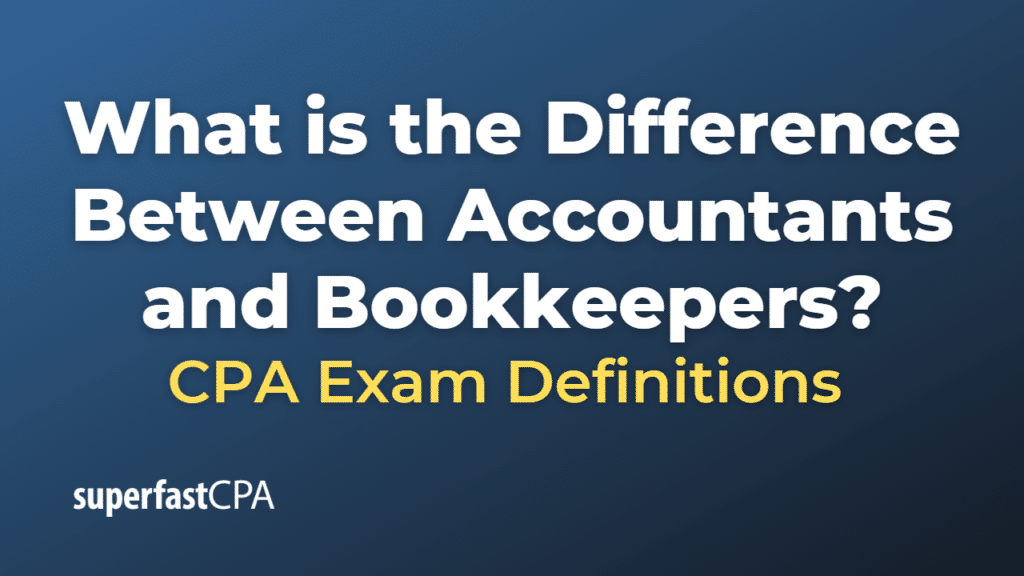Difference Between Accountants and Bookkeepers
Accountants and bookkeepers both work with financial data, but their roles, responsibilities, and skills tend to differ. Here’s a comparison of the two:
1. Education and Certification:
- Bookkeepers: Usually, bookkeepers are not required to have a bachelor’s degree, though they may have associate degrees or certificates in bookkeeping. There’s a certification available – Certified Bookkeeper (CB) – from the American Institute of Professional Bookkeepers, but it’s not obligatory.
- Accountants: Accountants typically have at least a bachelor’s degree in accounting or a related field. Many choose to become Certified Public Accountants (CPAs), which involves passing a national exam and meeting other state-specific requirements.
2. Job Responsibilities:
- Bookkeepers: Bookkeepers are responsible for recording and classifying all financial transactions, including purchases, sales, receipts, and payments. They maintain complete and up-to-date records of all transactions. They may also handle payroll, pay bills, and prepare invoices.
- Accountants: Accountants analyze the financial information prepared by bookkeepers and use it to produce financial models and forecasts. They prepare income statements, balance sheets, and cash flow statements. They’re often responsible for tax planning and preparation, financial auditing, and consulting on financial management strategies.
3. Analysis and Decision Making:
- Bookkeepers: The role of a bookkeeper is more transactional and administrative, focusing on accurately recording financial transactions.
- Accountants: Accountants are more likely to use the information compiled by bookkeepers to provide strategic insight and guidance. They are involved in more complex tasks such as tax planning, budgeting, financial forecasting, and decision-making processes.
4. Software Use:
- Bookkeepers: Bookkeepers often use software like QuickBooks, Xero, or Sage to record financial transactions and keep track of the company’s financial records.
- Accountants: While accountants also use these tools, they often work with more advanced systems designed for complex reporting and financial analysis.
Both roles are essential for the smooth financial operation of a business, but they serve different functions. Smaller businesses might have one person or team handling both roles, while larger companies might have separate departments for bookkeeping and accounting.
Example of the Difference Between Accountants and Bookkeepers
Let’s use a small business — let’s say a local coffee shop — to demonstrate the roles of a bookkeeper and an accountant.
- Bookkeeper’s Role:
- The bookkeeper records all the financial transactions of the coffee shop. This includes keeping track of all the sales made each day, recording expenses such as purchases of coffee beans and pastries, and payments for utilities, rent, and salaries.
- The bookkeeper also manages payroll for the coffee shop’s employees, ensuring everyone is paid accurately and on time.
- At the end of each month, the bookkeeper prepares financial records showing all the transactions that took place during the month.
- Accountant’s Role:
- The accountant takes the financial records prepared by the bookkeeper and analyzes them to provide a clearer picture of the coffee shop’s financial health.
- The accountant prepares the income statement and balance sheet for the coffee shop, providing insights into the shop’s profitability and financial position.
- During tax season, the accountant is responsible for ensuring that the coffee shop’s taxes are properly calculated and filed on time.
- The accountant also helps the owner of the coffee shop with financial planning. For example, they might analyze sales trends to predict future revenues, or evaluate the cost-effectiveness of purchasing new coffee-making equipment.
In this example, you can see that while both the bookkeeper and accountant are crucial to the financial management of the coffee shop, they have distinct roles and responsibilities. The bookkeeper is focused on accurately recording all financial transactions, while the accountant uses those records to provide strategic financial advice and support.













